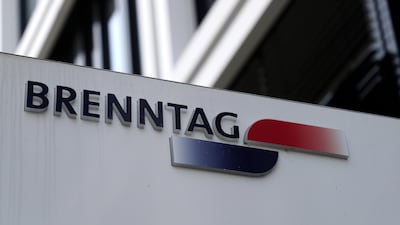There are no grounds to investigate the world’s largest chemical distribution company over sales of substances that could be used to manufacture chemical weapons to a Syrian company, german prosecutors ruled on Tuesday.
German newspaper Sueddeutsche Zeitung and other newspapers reported in June that Brenntag AG had sold ingredients with potential dual-use in painkillers and nerve gas to a Syrian drugmaker, hitting its shares on concern over political repercussions in the United States.
But the prosecutors' office in the western city of Duisburg said there were no sufficient signs of wrongdoing that would justify an investigation into Brenntag, a company that employs 16,600 people.
Duisburg prosecutors had taken over the case from counterparts in Essen, who in June received the initial complaint about Brenntag from three non-governmental organisations: New York's Open Society Justice Initiative, Berlin's Syrian Archive and Switzerland's Trial International.
Brenntag said in June that a Swiss subsidiary had in 2014 supplied diethylamine and isopropanol to Syrian drugmaker Mediterranean Pharmaceutical Industries (MPI) to produce a painkiller, in line with relevant laws and regulations.
Swiss drugmaker Novartis said it had granted MPI contract manufacturing and local distribution rights for pain relief skin gel Voltaren.
“Delivery of both products was made in accordance with applicable law,” Brenntag said in its statement.
The German company said it did not circumvent European Union export restrictions and said the Swiss State Secretariat for Economic Affairs had confirmed compliance with export regulations.
The UN Commission of Inquiry on Syria said in March that government forces had perpetrated 32 of 37 chemical attacks it had reported during the Syrian war. The government denies using chemical weapons.
Even before the civil war, Syria held a large stockpile of state-manufactured chemical weapons, although it long denied it had such a programme.
Through 2012 and 2013 various countries gathered evidence of numerous chemical weapons attacks on civilians, many of which were carried out by the government.
Then there was a chemical weapons attack on Ghouta near Damascus in 2013 that the US believed had killed over 1000 people, although the death toll varied significantly between different monitors.
In response, the US threatened to take military action against Damascus until Syria agreed to join the Chemical Weapons Convention and allow Russia and UN watchdogs to assist in the disposal of their arsenal.
The destruction was completed in August 2014. However, there have been subsequent reported chemical weapons attacks although most of these have relied on weapons that utilise gasses such as chlorine that are more difficult to control access to as they have numerous legitimate uses.

